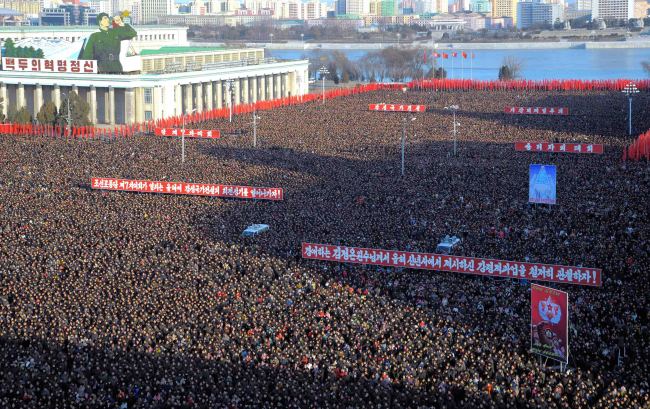After its Jan. 6 nuclear test, North Korea is increasing calls for a peace treaty with the U.S. in apparent efforts to secure its regime survival, rationalize provocations, ease isolation and help economic development, analysts said Monday.
Since the fourth nuclear test, North Korea’s state media have been churning out reports stressing the importance of a peace treaty and upbraiding the U.S. for escalating military tensions by disregarding Pyongyang’s repeated requests for the treaty.
Seoul has dismissed Pyongyang’s demand as an attempt to circumvent the international criticism for the latest provocation as well as its responsibility for it. Washington has apparently thought of the demand as insincere — in line with its erstwhile stance of “strategic patience.”
The North’s media including the Rodong Sinmun, the daily of its ruling Workers’ Party, have called for the U.S.’ “right” policy decision to agree to a peace treaty, while pledging to strengthen its “nuclear deterrent” unless the U.S. renounces its “hostile” policy toward the North.
 |
| North Korea held a mass rally in support of North Korean leader Kim Jong-un’s New Year address at Kim Il-sung Square in Pyongyang on Jan. 5, the North’s Korean Central News Agency reported. Yonhap |
Last Thursday, an association of the North’s lawyers issued a statement, arguing, “The U.S.’ opposition to the peace treaty and its instigation of military actions to suppress the North constitute an international crime.”
Analysts said that above all, the crucial reason behind the North’s obsession with a peace treaty would be to secure its regime — now under inexperienced leader Kim Jong-un, who has spent the past four years consolidating his power through a reign of terror.
“The peace treaty for the North means a guarantor of its regime survival,” said Ahn Chan-il, head of the World North Korea Research Center.
“The North may think that without the treaty, it cannot completely secure its regime in the face of an economically stronger South Korea, which is armed with stronger conventional weapons. It believes as long as its inferiority persists, it can be absorbed by the South.”
Compounding the challenge to securing genuine peace here is the possibility that Pyongyang may seek any negotiations with Washington based on the premise that it is already a de facto nuclear power following four nuclear tests in 2006, 2009, 2013 and earlier this month.
“In the past, negotiations were about offering to the North a peace treaty in exchange for the North’s denuclearization. But now, the North is likely to seek to strike a peace treaty based on the U.S.’ acknowledgement that it is a de facto nuclear power,” said Chang Yong-seok, a senior researcher at the Institute for Peace and Unification Studies at Seoul National University.
“The North may seek the kind of peace through strength — the kind of strength stemming from its possession of nuclear arms.”
Pyongyang’s stepped-up offensive for peace may strike a positive note for disinterested parties. But Seoul and Washington have long viewed it with great suspicion.
The allies have thought that with the treaty, Pyongyang has intended to drive U.S. forces out of the peninsula; remove the U.S. provision of the nuclear umbrella for the South; dismantle the U.N. Command monitoring the armistice agreement; and ultimately erode the South Korea-U.S. alliance.
Despite such concerns, Pyongyang is pressing ahead with its demand for the treaty, which it may believe would enable it to restore ties with the U.S. and help forge an external environment conducive to its efforts for economic development.
“The North Korean leader has so far emphasized the enhancement of people’s livelihoods, for which it is crucial to disentangle external relations and forge a peaceful external environment,” said Koh Yoo-hwan, North Korea expert at Dongguk University.
“The centerpiece of the North’s endeavors to improve foreign relations is to clinch a peace treaty with the U.S.”
Koh added that Pyongyang’s call for a peace treaty is pressuring Washington to choose between letting the unpredictable regime continue to advance its nuclear capabilities and addressing the nuclear conundrum through the treaty.
“After all, Pyongyang rationalized its latest nuclear test, arguing that as long as the U.S. does not come out for peace treaty talks, it would continue its path toward bolstering its nuclear capabilities,” he said.
By Song Sang-ho (sshluck@heraldcorp.com)

